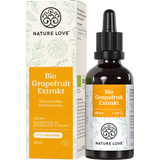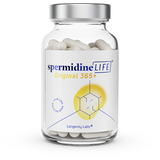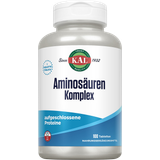Fermented Food - What's That?
Fermented foods have been manufactured and consumed by humans for thousands of years. But what is it exactly? Read more here!
What are fermented foods?
Fermentation refers to conversion processes in which organic substances under go a change due to microbe or enzymes. This conversion is caused by bacteria or fungi and leads to a more refined product, so to speak.
The pH of the food becomes increasingly acidic during fermentation. This means that the food no longer spoils as quickly because bacteria can no longer multiply, making it more durable.
The term fermentation comes from the Latin word "fermentatio" which actually only means fermentation.
What kinds of fermented foods are there?
Fermentation plays a very important role in the production and preservation of food. In addition, many flavours develop during this process, like in soy sauce! When beverages ferment, tannins are broken down, making them more enjoyable, like in coffee or tea. Common fermented foods include:
- Yoghurt
- Kefir
- Kimchi
- Kombucha
- Miso
- Sauerkraut
- Soy sauce
- Tempeh
Fermentation also plays a major role in the production of various alcoholic beverages such as beer, wine or whiskey.
How does fermentation change food?
Fermentation refines food. This means that the herbal ingredients already present in the food as well as their concentrated vitamins or minerals and bioavailability increases. Our body generally absorbs the nutrients from fermented foods more easily.
This means that fermentation has a positive effect on the food itself. However, fermented foods are not enjoyed as often nowadays as they used to be. For example, sauerkraut was often carried on ships because it has a high vitamin C content and thus prevented scurvy. These days, we have better food storage options and do not have time time to wait for fermentation to finish, which may take weeks or months.
Can you buy fermented food?
Fortunately, fermented foods can be found at almost any supermarket. Just be careful to read the details on the label to see if the food has actually been fermented. Some foods that used to be fermented are now simply pickled in vinegar.
Balance your diet
Most fermented foods make a valuable contribution to a balanced and healthy diet. (Alcoholic beverages don't fall into this category, sadly)
You can make fermented foods yourself if you have the time and motivation to do so. Most fermented foods are not hard to make, but you will need to be patient to wait for the fermentation to finish.
Just be careful not to overdo it on fermented products. It takes the body a while to digest fermented foods well. To prevent digestive problems, you should take it slow and enjoy them in moderation.
Latest reviews
-
 4.6 (7)
4.6 (7)Nature Love Organic Grapefruit Extract, 50 ml
- Gentle cold extraction
- Made from grapefruit seeds & peels
- One bottle lasts for 3 weeks
£15.25 (£305.00 / l)Delivery by May 13
-
 4.3 (3)
4.3 (3)Ketofabrik Chocolate Coconut Bar, 1 bar
- 1g sugar per bar
- Reduced sugar alternative
- 3.6g net carbs per bar
£1.50Not available at the moment
-
 4.7 (11)
4.7 (11)Longevity Labs spermidineLIFE® Original 365+, 60 capsules
- Approved EU wide as a novel food
- From Austria
- No artificial dyes or flavours
£63.50Delivery by April 25
-
 £37.00 (£264.29 / kg)
£37.00 (£264.29 / kg)Delivery by April 25
Magazine Articles:
-
Great Britain: Free standard delivery from £49.90
-
Free
returns -
We operate in a
climate-conscious manner. More than 7.800 products

